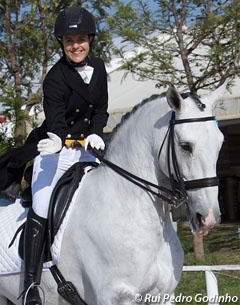
I have talked about letting go of ego if you want to be successful in the sport of dressage. While I am slowly able to accept my weaknesses in the saddle, I am learning that beyond excepting critique is creating a mindset that is set up in a positive and constructive way. I call it the “Classical Mindset and based on previous principles of learning, this mindset cannot be measured, but must be learnt and adopted by the rider, in order to achieve harmony and balance with the horse.
It is one thing to be a rider than can accept criticism and instead of answering back, or telling the instructor why he can’t do something, being a rider that can just continue on with the lesson. It is quite another thing to actually set up your own mind and stop making excuses to yourself, building a mindset that is capable of not only analysing what happened, but constructively searching for a solution.
For example. Your instructor tells you that you did not prepare that transition to walk:
Rider A says back to the instructor, “I did but my horse anticipated me.”
Rider B doesn’t answer back, but thinks to themselves, “I tried, I really did try to get a good transition, this is so hard, I will try really hard next time”.
Rider C doesn’t answer back, doesn’t excuse himself, and thinks “so If i didn’t prepare it why didn’t I? What happened that preventing me preparing it? Am I not on the ball, is my horse not listening to my aids? and “How could I improve this transition next time?”.
Rider C is in the classical mindset, because he is not wasting time arguing with the instructor, or with himself. He is immediately beginning to construct his mind to allow for the possibility of a much better transition the second time around.
If you ride alone, the classical mindset can be even more effective in helping you to train yourself. If you are trotting down the long side, and the trot feels really great.
Rider A thinks, “This is such a good trot I will just sit really still so I don’t muck it up.”
Rider B thinks, This is a good trot, but I bet it isn’t as good as that other time when it was really good.”
Rider C thinks, “This is a good trot, I wonder if I can get ask for a bit more? Am I keeping him supple in the neck” Is he straight while he is trotting like this? Can I now do an exercise and see if I can keep this trot?”
If the trot is really good and you know that is the most you should ask from your horse at that time, Rider C would then think, “so what did I do today that allowed me to create the necessary elements to achieve this trot? What was my warm-up? Am I riding differently? Is my horse more relaxed and what factor may have contributed to his relaxed mood?”
Rider C obviously gets more tired, but he also takes away a lot more from a single ride, than Rider A and B ever will. While it is a good thing not to think too much and to listen to your horse, it is also vital that you create a positive and constructive mindset for learning. Every top trainer/rider will tell you that the minute you think you have learnt everything about dressage, is the moment when you will no longer have a place in this wonderful sport.
Once you have overcome your ego, you will realise that each day can be a vital learning arena, if you just set your mind up to take from it and learn from it, and never shut off the possibility that a positive mindset may just be the difference between an 8 and a 5 in the ring. This classical mindset, if practiced correctly, should also be used to help a rider connect with their horse, and in the pursuit of their own perfection, establish something that cannot be measured, or taught.
Too often we see riders get so caught up in the technical aspect of competition, that they loose sight of the animal and the personality underneath them. In this classical mindset we must nurture the beautiful thing that is made in dressage, a sport where two living things work as one. Set your mind on achieving something, open your mind to try that bit more, be that much more determined, and mentally connect with your horse.
My idol Nuno Oliveira wrote a letter in 1961 saying that he believed there were two types of riders:
“Those who are skilled and use the horse as a tool, and those who love him and allow him to express the brilliance of which he is capable. The former are not less expert than the latter.” Oliveira continued, “During dressage tests they may even triumph although never taking a risk of making a mistake when the opportunity to yield the hand occurs and lightness presents itself. The latter always risk being the damned poets of this art. They are misunderstood by the masses of riders who cannot distinguish between the means used by the former or those of the latter. Only the latter enjoy the true pleasure of feeling how a creature cooperates without constraint, as a friend.”
I know which of the two Nuno talks of that I would rather be.
by Sarah Warne - Photo © Rui Pedro Godinho
Sarah Warne's Classical Training Articles